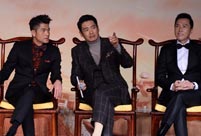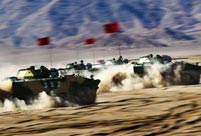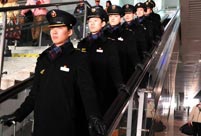 Cockfighting show staged in E. China's Heze during Spring Festival
Cockfighting show staged in E. China's Heze during Spring Festival
 Chinese New Year Flower Fair opens in San Francisco
Chinese New Year Flower Fair opens in San Francisco
 Festivities in Shanghai
Festivities in Shanghai
 PLA navy conducts drill in North China Sea
PLA navy conducts drill in North China Sea
 World's high-tech hotels
World's high-tech hotels
 Li Na poses with trophy on Brighton Beach in Melbourne
Li Na poses with trophy on Brighton Beach in Melbourne
 Six Chinese divers back safely after 300-meter saturation dive
Six Chinese divers back safely after 300-meter saturation dive
 Traditional wedding ceremony of Yao people
Traditional wedding ceremony of Yao people
 Taipei Game Show attracts geeky gamers
Taipei Game Show attracts geeky gamers
Japan's revision of teaching manuals was a false and dangerous move that not only risks generations of confrontation but also threatens regional development and will eventually harm Japan itself, experts said on Thursday.
Japanese Education Minister Hakubun Shimomura on Tuesday announced that the ministry has revised the country's teaching manuals for junior and senior high schools to claim areas disputed between Japan and China and between Japan and South Korea.
The new manuals describe the disputed territories as "Japan's integral parts," including the Diaoyu Islands, which are inherent territories of China.
Tokyo and Seoul are also at odds over a pair of islets in the Sea of Japan. They are known as "Dokdo" in South Korea and "Takeshima" in Japan.
Zhu Yan, a professor of political science and economics at Takushoku University in Tokyo, said that the revision of Japan's teaching manuals this time was to show current Japanese Prime Minister Abe Shinzo's right-leaning, tough attitude toward territorial issues.
"Japan now has many textbooks and schools may choose by themselves. But once the guidelines for writing textbooks are revised and Abe's provocative act becomes social consensus, it will be dangerous for the situation," said Zhu.
So far, there are still a number of scholars and politicians in Japan who believe that Japan should admit the existence of territorial disputes and reflect on past aggression. Murata Tadayoshi, honorary professor at Japan's Yokohama National University, has said that the disputed islands between Japan and China are not Japanese inherent territories.
Banri Kaieda, head of Japan's main opposition party, the Democratic Party of Japan (DPJ), also blasted Abe's foreign policies in a Diet session on Tuesday, saying the current government has taken provocative actions that have further escalated tensions between Japan and neighboring countries.
Wang Taiping, former Chinese ambassador to Japan and now researcher at the China Institute of International Studies, said the status quo is "serious." Wang rebuked Japan for teaching the next generation false claims to the island.
Diaoyu Island and surrounding islands have been Chinese territory since ancient times, a fact that should be properly dealt with by Japan, according to Wang.
"What's more, beneath the Diaoyu Island textbook dispute is Abe's deeper-rooted dream of achieving his ultimate goal through rewriting history," he said.
Abe has been walking a path that aims to challenge post-war order, rewrite Japan's peaceful constitution, re-militarize Japan and regain the so-called "greatness" of the island nation, without the burden of history, Wang said.
But those attempts to manipulate public opinion are doomed to fail, as "lies can't cover up the facts, and there will be no future for those who do not face up to history," said Wang.
Just three days ago, during the 70th anniversary of the liberation of Auschwitz and the end of the siege of Leningrad, German President Joachim Gauck wrote a letter to his Russian counterpart, Vladimir Putin, to apologize for the suffering inflicted by German troops.
"Whereas Japan's behavior was just the contrary. It reflects the militarism of the country. A nation that cannot face up to history is hopeless," said Fu Qiang, a lawyer and president of a group providing legal support for those who were captured or enslaved by the Japanese during World War II in east China's Shandong Province.
Business leaders also expressed concerns over Abe's move to revise the teaching manuals.
Bao Shuping, CEO of Shanghai Hyron Software Co., Ltd., whose major shareholders are Japan's Omron Corporation and Shanghai Jiaotong University, said that the most desirable thing for enterprises is stability in Sino-Japanese trade and business exchanges.
"We disagree with Mr. Abe's wayward act in turning 'right,' which has added fuel to the already tense relations," Bao said.
"Peaceful relations and sustainable non-governmental exchange should be cherished and sustained," said Bao.
Another Japan-related businessman in China who preferred not to disclose his name or company said strained political ties between the two countries will have varying effects on different industries.
"Japan's electronic devices and cars have certain advantages, but if their sales fall in China, their loss will be huge," he said.
 3D film 'The Monkey King' premieres in Beijing
3D film 'The Monkey King' premieres in Beijing  Miss Chinese Int'l Pageant 2014 held in Hong Kong
Miss Chinese Int'l Pageant 2014 held in Hong Kong 'Golden Flowers' in the Spring Festival travel rush
'Golden Flowers' in the Spring Festival travel rush Li Na beats Cibulkova to win Australian Open
Li Na beats Cibulkova to win Australian Open Sexy models at Taipei Game Show 2014
Sexy models at Taipei Game Show 2014 'Living in ice house' competition held in central China
'Living in ice house' competition held in central China  Highlights of Chinese airborne troops'exercises
Highlights of Chinese airborne troops'exercises  All-male high speed train crew during Spring Festival travel rush
All-male high speed train crew during Spring Festival travel rush PLA navy drills in East China Sea
PLA navy drills in East China Sea President Xi visits border troops ahead of Lunar New Year
President Xi visits border troops ahead of Lunar New Year What do Chinese pack in their luggage in Spring Festival Rush?
What do Chinese pack in their luggage in Spring Festival Rush? Blind date fair in Hangzhou of Zhejiang province
Blind date fair in Hangzhou of Zhejiang province Film 'Where Are We Going, Dad' premiered in Beijing
Film 'Where Are We Going, Dad' premiered in Beijing  Australian Open champion Li Na returns to hometown Wuhan
Australian Open champion Li Na returns to hometown Wuhan Twin sisters serve during Spring Festival travel rush for the first time
Twin sisters serve during Spring Festival travel rush for the first timeDay|Week|Month